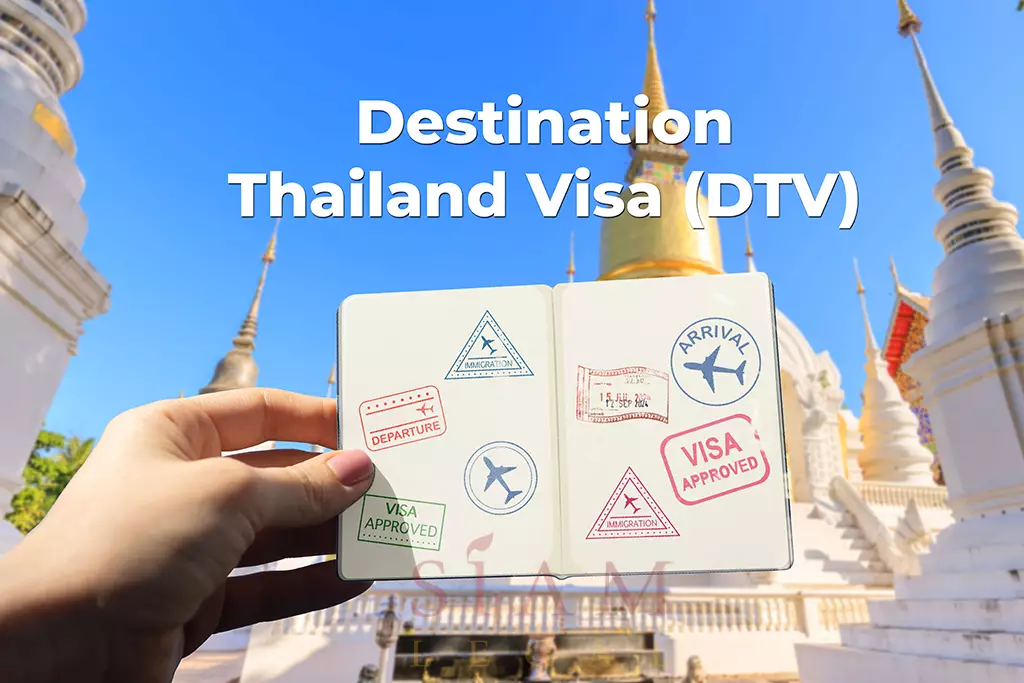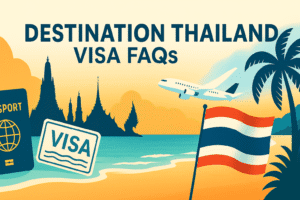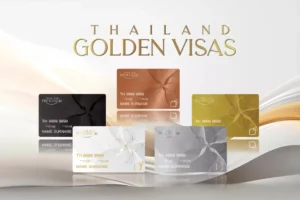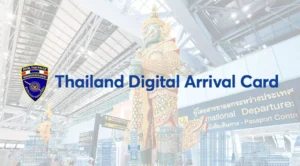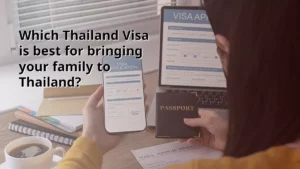As of July 15, 2024, the Thai government has confirmed the Destination Thailand Visa (DTV) is now live for those looking to work and travel (“workcation”) in Thailand. The DTV allows holders to stay in Thailand for up to 180 days per entry and is valid for 5 years.
Known informally as the “digital nomad visa,” the DTV is a cost-effective and convenient Thai visa option if you are a freelancer, digital nomad, or remote worker seeking a simple way to work from the tropical paradise of Thailand.
Alternatively, you can also qualify for this visa if you plan to participate in so-called “Thai Soft Power” activities. You are eligible for the DTV if you plan to attend Thai boxing or cooking classes, participate in sports training, undergo medical treatments, take short-term educational courses, take part in seminars, or join artistic or musical festivals.
This page will explain what the DTV is, what its requirements are, and the DTV application process.
Destination Thailand Visa Basics
As we’ve covered earlier, the DTV is a visa designed for digital nomads that offers a long-term and flexible stay in Thailand with the freedom to engage in other pursuits while working in the country. To learn more about what the DTV offers, we’ve provided you with an overview below:
- Visa Duration: 5-years
- Visa Type: Multiple entry
- Length of Stay per Entry: 180 days
- Extendable: Yes, once per stay
- Obtainable From: A Royal Thai Embassy/Consulate or online through Thailand’s official e-visa website (cannot apply while in Thailand)
- Minimum Age for Primary Visa Holder: 20 years old
- Option to Include Family: Yes
It is important to note that the DTV is a special kind of tourist visa in Thailand, which means that holders are prohibited from obtaining a Thai work permit and working for companies in Thailand or performing freelance work for Thai clients.
Who is Eligible for the Thailand DTV Visa?
To apply for a DTV, you must fall under one of the following three categories:
Workcation (Digital Nomads, Freelancers, Remote Workers)
As mentioned before, the DTV’s target audience consists of digital nomads, freelancers, and remote workers. This means that if you work remotely for a foreign company or work for yourself as a freelancer, this visa is designed for you.
Though the Thai government has pointed out that “not just anyone” can obtain a DTV as a digital nomad, they did not, as of this writing, specify the minimum income, employer, or social media follower requirements. Still, it is unlikely that you will qualify for the DTV if the Thai authorities do not consider your foreign employer to be “legitimate.”
Thai Soft Power Activities
If you do not work online but want this visa anyway, you can still qualify for the DTV if you plan to engage in “Thai Soft Power” activities. These include:
- Muay Thai courses
- Thai cooking courses
- Sports training
- Medical treatment
- Seminars
- Music festivals
This category exists because these activities enhance the prestige of Thailand’s culture and improve the country’s standing in the international community. However, be aware that for the best chance of approval, the activity or course you join should have a duration of at least than 6 months.
Dependent of Thailand DTV Holders
One of the more attractive features of the DTV is that it allows dependents to join primary DTV holders. There is no limit to the number of dependents you can bring to Thailand, but they must either be your legal spouse or dependent children who are younger than 20 years old and unmarried. Each dependent must apply separately and pay a separate visa fee.
What are the Requirements for a DTV?
If you are going to apply for the DTV, there are just a few requirements you have to meet, but they will differ depending on your category: workcation, soft power activity, or dependent. Make sure you have these documents ready before starting your application.
- Passport biodata page or travel document
- Passport-sized photograph (on a white background)
- Proof of current location such as a passport stamp or residence permit
- Proof of payment of the visa fee (varies depending on the consulate; typically 400 to 500 USD)
- Evidence of sufficient financial assets (at least 500,000 THB) which can take the form of:
- 6-month official bank statement (crypto or other investment statements are not accepted)
- Payslips
- Sponsorship letters
- Documents proving the purpose of the visit:
- Workcation:
- Employees:
- A Certificate of Employment or Employment Contract
- A letter from your employer confirming your remote work status and ongoing salary
- Personal tax return and recent payslips (optional but recommended)
- Employees:
- Workcation:
-
- Business Owners:
- Cover letter
- A Certificate of Incorporation
- Corporate tax return
- Freelancers
- A professional portfolio or evidence of freelance work (such as invoices, screenshots of profiles on platforms like Fiverr, LinkedIn, or personal websites).
- Business Owners:
- Thai Soft Power Activities: Proof of confirmation to attend cultural, educational, or professional development activities in Thailand, as well as supporting documents such as a copy of the institution’s business registration. It is important to note that the Thai cultural activity should be at least 6 months long. Any shorter and you risk having your application denied.
- Dependent: Proof of relationship such as a marriage certificate, birth certificate, or certificate of adoption
Note: There are no set criteria for exactly which documents you need to show or how these documents need to be prepared. Approval is solely at the discretion of the Thai embassy officer working on your case.
It’s for this reason that you should have experienced DTV consultants like those at Siam Legal review your application materials. We’ve handled many successful applications through several different Thai embassies worldwide, so we know what Thai authorities are looking for and can arrange your application packet for maximum chances of acceptance.
The Destination Thailand Visa Application Process
There are several options when applying for the Destination Thailand Visa.
First, you can visit the nearest Royal Thai Embassy or the Royal Thai General Consulate in person. However, it is important to note that some embassies and consulates may not accept applications from non-residents who do not hold residence permits or long-term visas in their country. While not necessary, you have the best chance of approval when applying through the embassy in your home country or country of residence.
As mentioned earlier, though, each embassy is different, and may charge different DTV fees, demand to see more than 500,000 THB in your accounts, or require more/different evidence of finances or employment. Because of this, it is recommended that you call ahead to confirm your local embassy’s requirements.
Another option is to apply online through the Thai e-Visa portal. This platform enables you to complete your application without going to the embassy in person. Keep in mind, however, that while this is done online, your application will still go through your local embassy, so you must also do this from outside of Thailand.
Extending the Destination Thailand Visa
Once you have your DTV visa and are in Thailand, you can stay for 180 days before needing to leave the country and refresh your stay. You can also extend your stay by an additional 180 days, allowing you to stay in Thailand for nearly a year without having to leave and return. To do this, you will have to visit the immigration HQ in Bangkok, then file for an extension, and pay the DTV extension fee (1,900 THB).
Get Professional Assistance with Your DTV Application
If you want a Destination Thailand Visa and a hassle-free application process, retain the services of Siam Legal International. We are a full-service law firm and visa consultancy with over 20 years of experience in helping clients from all around the world secure immigration solutions in Thailand.
Our immigration team will walk you through the application process for the DTV or any other Thai visa you might need and ensure that you get your visa quickly and successfully. With our professional assistance, you can minimize your stress and focus on building your future in the Land of Smiles.
To learn more about our services and fees, check out Siam Legal’s DTV Visa Services page.
Thailand DTV Visa FAQ
Is the DTV the cheapest long-term Visa?
The Destination Thailand Visa costs 10,000 THB. This is considerably less than similar visas from other countries in Southeast Asia and other Thai visas, but keep in mind that you must have significant funds in the bank when you apply to prove that you can support yourself while in Thailand. So, while cheaper on paper than many other long-term Thai visas, its significant financial requirement of 500,000 THB or more may be an insurmountable obstacle to many.
How long can you stay in Thailand on the DTV?
If you successfully apply for a DTV, you’ll receive a 5-year multiple-entry visa. You can stay in Thailand for up to 180 days per entry with a DTV, but after reaching the 180-day limit, you must leave the country and re-enter to continue staying legally. However, as this is a multiple-entry visa, you can leave and re-enter Thailand as many times as you want over the course of its validity.
Furthermore, you can extend the 180-day period for another 180 days, once per year for an extension fee. So in effect, you can stay in Thailand for nearly an entire year before having to leave and re-enter.
What’s the easiest way to get a DTV in Thailand?
You cannot apply for the DTV while in Thailand. You will have to travel to a foreign country and apply through the Royal Thai Embassy or Consulate.
If you are in Thailand and wish to apply, our DTV consultants can provide you with the closest and easiest option based on your nationality and circumstances so that your application journey is as short and swift as possible.
Do I pay Thai taxes on my foreign income as a DTV holder?
This depends on the duration of your stay. According to Thai tax law, anyone who stays in Thailand for over 180 days out of a calendar year will be considered a tax resident by the Thai government. You will be liable to pay Thai income taxes on your foreign income if you are a tax resident.
Keep in mind though that you only have to pay tax on your foreign income if you bring it into Thailand, and if your foreign income is taxed by a country with a double-tax agreement with Thailand, you may be fully or partially exempt. Speak to a Thai tax consultant to learn more about your obligations as a foreign taxpayer.
The DTV does not seem like a good fit for my needs. Are there similar visas that might be a better choice for me?
If your goal is to work and/or relax in Thailand long term and the Destination Thailand Visa does not seem like a good fit for you, there are other visas that could meet your needs.
The Long-Term Resident Visa (LTR Visa Thailand) is geared toward professionals working in Thailand and even has a special category for remote workers. The LTR provides an uninterrupted 10-year stay in Thailand and has many other important perks for professionals such as tax exemption for all your foreign-earned income.
The Thailand Elite Visa is the opposite, being geared more toward long-term tourists, offering stays of 5-20 years. It provides a similar flexible visa and only requires you to leave the country once a year. What sets it apart most is the huge mountain of VIP benefits and luxury perks it provides. If you’re just looking to relax in Thailand with maximum comfort, this might be a better option.







